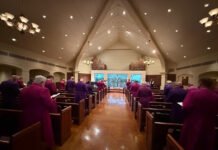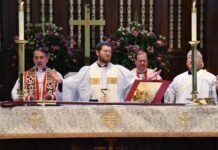The following is a Word to the Church from Presiding Bishop Michael Curry, and is also the text of his sermon at The Episcopal Church House of Bishops, which met virtually September 16, 2020.
And now in the name of our loving, liberating and life-giving God, Father, Son, and Holy Spirit, Amen.
This November, the people of the United States will elect a president and many others to public office. This election occurs in a time of global pandemic, a time when there is hardship, sickness, suffering and death. But this election also occurs in a time of great divisions. Divisions that are deep, dangerous, and potentially injurious to democracy. So what is the role of the church in the context of an election being held in a time such as this? What is our role as individual followers of Jesus Christ committed to his way of love in such a time as this?
Allow me to offer a text from the Acts of the Apostles. The introduction to the Acts from the first chapter. Luke writes, “In the first book,” referring to the Gospel of Luke:
In the first book, Theophilus, I wrote about all that Jesus did and taught from the beginning until the day when he was taken up into heaven.
“In the first book . . . I wrote about all that Jesus did and taught.” All that he did, all that he taught.
In a powerful sermon preached at the July meeting of the House of Bishops, Bishop Scott Hayashi of Utah said something that might be helpful to us. He made mention of the little acronym, what would Jesus . . . WWJD, What Would Jesus Do? And he said that can be a helpful way of discerning what we might be being called to do at any given time. But he offered another alternative. He said, “What would happen if we began to ask the question, not what would Jesus do, but what did Jesus do? What did he do? What did he teach? What do Matthew, Mark, Luke and John tell us that Jesus did and taught?” I want to suggest that addressing that question, “What did Jesus do?” and summoning the Spirit to help us apply it to our lives and to our times may mean the difference between the church simply being another religious institution that exists for its own sake and the church being a Jesus movement that courageously follows the way of Jesus and his love, not for its sake, but for the sake of the world that Christ gave his life for and rose from the dead in.
As you know, The Episcopal Church does not endorse, support, or oppose political candidates for elective office. And there is good reason for that. First, in the United States, tax exempt, religious, and charitable organizations are by law prohibited from such endorsement, support, or opposition to candidates. This does not prohibit churches from engaging in voter education, voter registration, helping people get to the polls to vote, or even advocating for issues of public policy reflective of the tenants of our faith. And every citizen, including those of us who are members of the church have our rights and responsibilities as well.
Secondly, there are good and faithful followers of Jesus Christ who are Episcopalian. Some are Republican, some are Democrat, some are independents, some liberal, some centrist, some conservative. And just as we must respect the right of every citizen to cast his or her own vote according to the dictates of their conscience, so we must do so in the church, the body of Jesus Christ. And that is how it should be. The Bible says we have one Lord, one faith, one baptism, not one political party. But it’s important to remember that partisan neutrality does not mean moral neutrality. Partisan neutrality, bidden to us by human civil law does not mean moral neutrality, because we are bidden to obey the royal law of almighty God. And this may be where our text helps us.
“In the first book Theophilus, I wrote all that Jesus did and taught from the beginning until he was taken up into heaven.” When Luke says, “The first book,” he’s referring to the Gospel, but notice what he does so skillfully. Ancient tradition says that Luke was a physician. And we know that this Luke was the author of both the Gospel and the Acts of the Apostles and tradition says he was a physician. You can see elements of that throughout both books. But in this text, Luke the physician sounds more like Luke the lawyer. In this text, Luke is suggesting that the Jesus we see in the Gospel, what he did and what he taught, is precedent. It is the precedent for how those who would follow him will act and live in their days and in their times. Just as precedents are critical to the law, the precedent of Jesus is critical to the life of those who would follow him in the first century or in the 21st century.
When Jesus says that the entire law and will of God is summed up in the words, “You shall love the Lord, your God, with all your heart, soul, mind, and strength, and love your neighbor as yourself,” that’s precedent. When Jesus told the parable of the Good Samaritan about somebody, who as that old song says, “If I can help somebody along the way, then my living will not be in vain.” When he tells the parable of the Good Samaritan, of somebody who helps somebody else even though they were a different religious tradition, even though they were of a different ethnic group, even though they may have differed in their politics, differed in their worldview, differed in virtually everything except the fact that they inhale oxygen and exhale carbon dioxide. Even with all of those differences he helped him because that person, that man was a human child of God created in the image of God. Jesus says, “Now, who was neighbor to the man?” This is what loving your neighbor looks like. And then Jesus says, “Go and do likewise.” That’s precedent.
When, in the Sermon on the Mount, Jesus says, “blessed are the poor and the poor in spirit”; “blessed are those who are compassionate and merciful”; “blessed are the peacemakers”; “blessed are those who hunger and thirst and labor for God’s righteous justice to be done on the earth for all”; “do unto others, as you would have them do unto you”; “love your enemies, bless those who curse you, pray for those who despitefully use you”; my sisters, my brothers, my siblings, that is the precedent for what it means to follow in the way of Jesus in the first century or the 21st century.
Saint Paul heard and knew these teachings of Jesus. And he summarized their meaning. Do not be overcome by evil but overcome evil with good. Henry David Thoreau, Mahatma Gandhi, Martin Luther King, all spoke of this as the nonviolent way of love.
The task of the church in the first century or 21st century is to live by the precedent, to bear witness to the precedent and lift up the values of the precedent of Jesus in our time. Because as the book of Hebrews says, “Jesus Christ is the same yesterday, today and forever.” What would Jesus do?
So what can we do? Well, we can vote as individuals. We can vote, and we can help others to register and to get to the polls and cast their vote. We can encourage others to vote as their conscience leads them. And I know someone is probably thinking, that’s true but what does that have to do with Jesus Christ?
What does voting have to do with the Gospel? What does voting have to do with being a Christian? An election for public office is not a popularity contest between two or more people. It’s a contest of ideas about how to shape the future of a community, nation and maybe even a world. It’s a contest, a debate, a discernment of moral values and their relationship to public policy. Voting is an act of moral agency. It is an act of moral discernment and decision. It is how a community or a nation decides how the moral values that it holds and shares shape public policy and the lives of people. The children of God. It is salutary to remember that partisan neutrality does not mean moral neutrality.
The vote is so sacred and important for all people, regardless of your religious tradition or your politics or your nationality. The vote, as an act of moral humanity, is so important that people have given their lives for it. If you don’t believe Michael Curry, ask the people of Belarus right now. Ask the American martyrs who sacrificed, gave their lives, gave that last full measure of devotion so that people might have the right to vote. Ask Michael Schwerner, ask James Chaney, ask Andrew Goodman in Mississippi, ask the martyrs of Selma, of Viola Liuzzo, Jimmie Lee Jackson, Jonathan Daniels.
America’s soldiers have fought to defend freedom. Many of them have given their lives. And many of them live with wounds and the scars of war. And one of the freedoms they defended was the freedom, the right, and the responsibility of the vote.
John Lewis in his last published writing before his death said, and I quote, “The vote is the most powerful nonviolent change agent that you have in a democratic society,” end quote. There actually is in the New Testament an example of this model of living for followers of Jesus. You’ll find it in the writings of St. Paul in the 12th, 13th, and 14th chapters of Romans. I don’t mean to suggest that Paul voted, he didn’t. He was a Roman citizen, but he lived not in the time of the Roman Republic, but in the time of the Roman Empire. But Paul in Romans 13 specifically identified the teachings of Jesus with how he would live his life in both civil society and in Christian community.
In the 13th chapter of Romans, he speaks about the role of government. And then he quickly shifts from speaking about the role of government to the role of the citizen. And then the role of the Christian, who is a disciple in the empire. He says, “You have to pay taxes to whom taxes are due, and an honor to whom honor is due.” And then he says, “But owe no one anything except to love one another. For the one who loves another has fulfilled the law.” The commandments, you shall not murder; you shall not commit adultery; you shall not steal; you shall not covet; and in any other commandment, are summed up in this word, love your neighbor as yourself. Love does no wrong to a neighbor, therefore love is the fulfilling of the law.
Partisan neutrality is not the same as moral neutrality. It was not in the first century and it is not today. The royal law of love is the fulfillment of the law and the will of God. It is the ultimate standard, norm and guide for following the way of Jesus in any society, in any time. With grace to aid and conscience to guide, each of us must discern and decide what love of neighbor looks like in our lives, in our actions, in our personal relationships and in our social and public witness. What did Jesus do?
The vote is vitally important, but it’s not enough. The wounds and the divisions in American society are so deep that even an election by itself cannot heal them. The murder of George Floyd, Breonna Taylor, and so many others has exposed the death-dealing depth of racism and white supremacy deeply embedded in the soil and in the soul of America. We can’t go on like this.
Just this past weekend, two deputy sheriffs in Compton, California were deliberately shot as they sat on duty in their car. And then a group of people tried to block the entrance to the hospital where they were being taken, shouting, “Let them die.” Those two sheriffs are children of God. George Floyd, and Breonna Taylor are children of God. We cannot go on this way.
In 1858, as divisions in this nation over slavery, born of racism, would lead to a civil war, Abraham Lincoln gave a speech warning the nation quoting the words of the Lord Jesus Christ, who said, “A house divided against itself, cannot stand.” I am not suggesting that we are on the verge of a civil war, but we must not underestimate the danger of the divisions that we are in. These divisions are dangerous, injurious to democracy itself. We must, and I believe we can, find a better way.
I am a follower of the Lord Jesus Christ, because I believe he has shown us that better way. I believe that the way of unselfish sacrificial love can show us the way of repentance, the way to repair the breach. The way of reconciliation that ultimately can lead us to the beloved community, but it’s not easy. And this is long distance work. There are no quick fixes because the wounds are so deep, but we need not feel enslaved by fate. We are not people of fate. We are people of faith in the God who raised Jesus from the dead. Nothing can defeat God or stop God’s cause of love. The way will not be easy, but we can do this.
I’ve included some links to resources that may be helpful to you:
- One is an online curriculum titled, “Make Me an Instrument of Peace: A Guide to Civil Discourse,” prepared by our Office of Government Relations.
- Another is titled, “Learn, Pray, Act: Resources for Responding to Racist Violence,” curated by our staff for racial reconciliation and justice and the Office of Government Relations.
- Another contains Resources from the Center for Racial Healing and the Diocese of Atlanta
- And another contains resources titled, “With Malice Toward None,” an ecumenical nonpartisan program designed for churches and faith communities and groups of all kinds to provide a way of understanding and healing for those on any side of the political spectrum, both before and after the November elections.
On March 10th, 2016, then presidential candidate Donald Trump spoke at a campaign rally in Fayetteville, North Carolina. The rally was disrupted by protestors, which happened around the country to both Trump and Clinton campaigns. Eventually law enforcement officials led the protesters out. As they did a 79-year-old Trump supporter named John McGraw, who is white, jumped out from the crowd and punched Rakeem Jones, one of the protesters who is black. Punched him in the face. Afterward McGraw said, and I quote, “He deserved it. The next time we see him, we might have to kill him. We don’t know who he is. He might be with a terrorist organization” end quote.
McGraw was arrested and charged with assault. Months later, the two men met again, this time in court. McGraw pleaded no contest, apologized and was sentenced to 12 months’ probation. Afterward, the two men faced each other and shook hands. McGraw said, and I quote, “If I met you in the street and the same thing occurred, I would have said, ‘Go home. One of us will get hurt. That’s what I would have said. But we are caught up in a political mess today, you and me, we’ve got to heal our country.’” Sometime after that, at the request of Rakeem Jones, John McGraw and Rakeem Jones went out and ate lunch together. There is the sign of hope. They went to lunch together.
There’s an old spiritual created and sung by slaves of antebellum America that said,
I’m going to come to the welcoming table one of these days.
I’m going to eat at the welcoming table one of these days.
I’m going to drink milk and honey at the welcoming table one of these days.
I’m going to cross the River Jordan one of these days.
I’m going to eat.
We’re going to eat at the welcoming table one of these days.
We can, we will, we must learn to eat at that welcoming table. Jesus has shown us the way, it is the way of unselfish, sacrificial love. And that way can make room for us all.
So walk together, children. Don’t you get weary because there’s a great camp meeting in the promised land. Amen.
Resources:
- “Make Me an Instrument of Peace: A Guide to Civil Discourse,” online curriculum from the Office of Government Relations
- “Learn, Pray, Act: Resources for Responding to Racist Violence,” curated by Episcopal Church staff for Racial Reconciliation and Justice and the Office of Government Relations
- Resources from the Center for Racial Healing and the Diocese of Atlanta
- “With Malice Toward None,” a program designed for churches and groups to provide a way for understanding and healing for all sides of our political divisions for both before and after the November election



